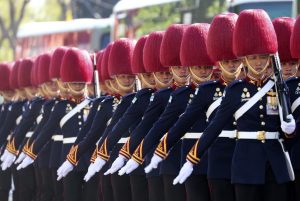Thailand’s king presided over an oath-taking ceremony Saturday at an army base where almost 7,000 soldiers and police paraded to mark Armed Forces Day.
King Maha Vajiralongkorn’s presence at the ceremony was unusual, as Thai monarchs have rarely, if ever, attended the occasion, even though the royal palace and the military are closely linked. Queen Suthida and the king’s oldest daughter, Princess Bajrakitiyabha, also attended.
The government announced that the ceremony was not only to mark Armed Forces Day, but also to honor the king’s coronation, which took place last year.
“I pledge my life to honor and sustain the greatness of the king. I pledge my loyalty to Your Majesty and will serve and guard Your Majesty till the end of my life,” the chief of defense forces, Gen. Pornpipat Benyasri, said as he led the oath-taking ceremony at the Adisorn Military Camp in the central province of Saraburi.
Vajiralongkorn gave his thanks for their oath of allegiance and said he hoped they would all keep their promise to work for the benefit of the nation and the people.
The monarchy and the military are the two most powerful institutions in Thailand, and exercise major influence over the country’s fragile democracy, evidenced most recently by coups the army staged in 2006 and 2014.
The military has declared protection of the monarchy to be its priority, stressing the point as the nation has undergone political upheavals in the past decade and a half that have shaken the almost total reverence for the monarchy obtained under Vajiralongkorn’s father, King Bhumibol Adulyadej, who died in 2016.
Vajiralongkorn has a strong military background. His education includes military training at the Australian army’s officer training establishmen, the Royal Military College at Duntroon, a suburb of the capital, Canberra. He took part on combat operations against communist guerrillas in the 1970s, and also has received training in special forces demolition and unconventional warfare tactics. He has concentrated his military service in the air force, and is qualified both as a plane and helicopter pilot.
Vajiralongkorn has exercised his influence as king to consolidate the monarchy’s power in several respects.
In October last year, he ordered some key army units to be put under his direct command, and has also assumed greater personal ownership and direction of the royal finances, estimated to exceed $40 billion, as well as had several plots of prime real estate in the capital, Bangkok, revert to the palace’s direct control.

































